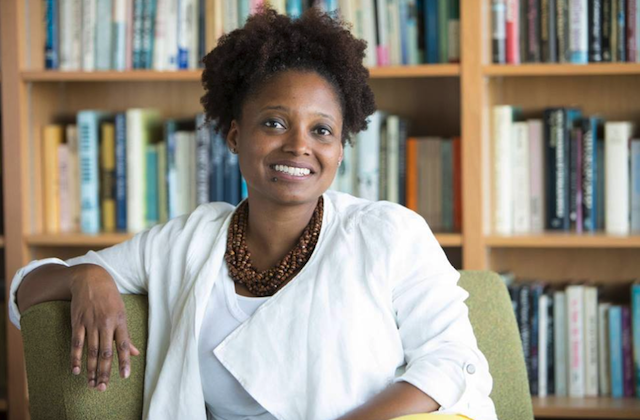Poet Tracy K. Smith discussed the impact of racism on her life in a new profile that The New York Times Magazine published online on Tuesday (April 10):
Smith’s parents came from the South, and she writes that she grew up with the knowledge that “pain was part of my birthright. …The very particular pain that was tied up in blood, in race, in laws and war.” Like many children who feel the burden of an older generation’s history, she feared the reckoning it would require. Though she knew the aggression she experienced to be “a mild, diluted version of what roamed about more brazenly in generations past,” she soon had her own stories to tell. “Don’t you wish you were White?” a White girl asked. A White boy on the school bus ripped off her necklace, saying, “Who do you think you are?” When a White classmate in her Christian youth group insisted on addressing her only as “Black Girl,” Smith offered little challenge. “I fed my own voice to the familiar silence that came around whenever it smelled pain,” she writes in [her memoir] “Ordinary Light.” “I fed the silence every time this strange tall girl called me out of my name, just as I fed the silence every time I failed to ask my mother and father what names Jim Crow had tossed their way when they were my age.”
The real story of the book is the gradual dawning of difference and what it meant—to the outside world and to her. “At such a young age, you begin to understand that there are these different ways you belong,” Smith told me. “And there is this constant awareness of figuring out: ‘How do I belong? To what extent don’t I belong?’ It’s almost like an involuntary math that you’re doing from moment to moment in your life, based on where you are and who you’re with, that most—well, that White people don’t do.”
Armed with this knowledge, Smith now uses her position as U.S. poet laureate to employ the transformative possibility of literature to speak past the noise of political discourse:
The meditative state of mind a poem induces, she believes, can be a “rehumanizing force,” an antidote to the din of daily life, in which our phones continuously buzz with news alerts perfectly algorithmed to reinforce our biases. “More than anything now, I’m looking for the kind of silence that yields clarity,” she told me. “I’m interested in the way our voices sound when we dip below the decibel level of politics.”
The article follows Smith through a speaking and reading tour in predominantly Black communities in South Carolina. These readings had a demonstrable impact on those who attended:
At all of Smith’s South Carolina readings, her audiences were clearly moved by the sight of a female African-American poet who spoke to their history—a sight they did not take for granted. And they were moved as well by the symbolism of Smith’s role as the official spokeswoman for poetry in the United States. “Somebody like Tracy Smith shows us that whatever we can do, we can do,” said Monifa Lemons, director of the Watering Hole, an advocacy group for Southern poets of color. Ebonie Burgess, a student majoring in health care administration at Francis Marion University, only recently became interested in poetry. “To see someone who looks like me and educated and smart and beautiful—you’re very beautiful,” she said to Smith. Ella Johnson, an elderly woman with braids coiled against her head, was also attending her first poetry reading. Smith signed her program and wrote a one-word poem on it: “Grace.” “It was grace that brought me this far and grace that will lead me on,” Johnson responded.
Read more and listen to Smith recite her poem, "I Will Tell You the Truth About This, I Will Tell You All About It," at NYTimes.com.
